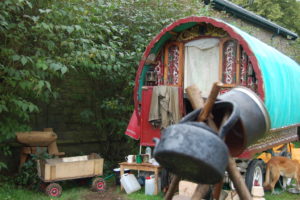 Near Hurnville, Texas, 1949: I think the horse’s name was Blue. I was five. My grandfather placed me before him, upon the saddle, and we rode down past the creek.
Near Hurnville, Texas, 1949: I think the horse’s name was Blue. I was five. My grandfather placed me before him, upon the saddle, and we rode down past the creek.
The house sat at hilltop, and the creek wound and wandered below. That’s where the trees grew. Thick and stunted trees, unruly, choked with vines and grasses, and below the west field tall pecan trees reaching high. And beyond the creek was a sluggish backwater. Grandfather called it the Slough.
It was there that we found the gypsies.
The real thing, they were. A wagon on tall, red-spoked wooden wheels, long faded. The wagon enclosed with wooden sides. No fanciful decoration like in the movies, just white paint with blue trim, a window behind the driver’s bench, and a doorway open from the back.
Unhitched, their horse grazed nearby, on the rich grasses in the meadow between the creek and the Slough. Grandfather had seen their campfire the night before, from the house. It meant they had unhitched the barbed-wire gate of his property. They were trespassing upon his land. As a rancher and farmer, this aroused indignation. But he was polite.
There was a thin man, wearing jeans and a blouse-like shirt, and a bandana around his head. Thin, wiry, dark-eyed, with sun-browned creases in his face and hands. A short, plump woman in a skirt and a man’s shirt, with black hair tied back. A bun? A braid? I do not recall. And a youngster, my age or younger, but with a wild and darting look, shoeless, silent, now smiling, now troubled, now shrewd. An unusual child, like an animal.
Over their campfire edged with stones, a stick propped, and holding a blackened kettle. Some sign of tin plates. A thin rope tied between two trees, with a few garments, drying.
The man made embarrassed hellos, cautious to see the reception. I don’t know what was said. I was five.
I believe that my Grandfather asked them to leave, at a certain time. I’d like to think he’d brought a covered basket of something good from my grandmother, covered with a blue and white checked cloth, perhaps biscuits from the oven and a cold jar of butter, perhaps a cool jug of buttermilk, fresh from the churn. But perhaps this is just a memory created by the years.
I do not know what happened to them, nor how they came there, nor when they went. None were seen again. Perhaps the cart and the horse vanished from our earth, soon after.
Gypsies. The real thing. I saw them, that day.


My favorite part: the second “I was five”. Made me smile.
Greetings,
I stumbled upon your blog while trying to learn more about the history of Henrietta. I grew up in Hurnville and this story made me smile. After moving away for several years, I’m hoping to return with an attempt to create a space for artists, musicians, and creatives. I’d love to hear more about your experience in Henrietta while living there!
Well, you’ll find dozens of stories about Henrietta among the microstories posted on this site. In the right-side column, in the search box, searching for “Henrietta” brings them all up. Looks like about 10 pages worth, probably 4-7 items on each page. Have fun! 🙂